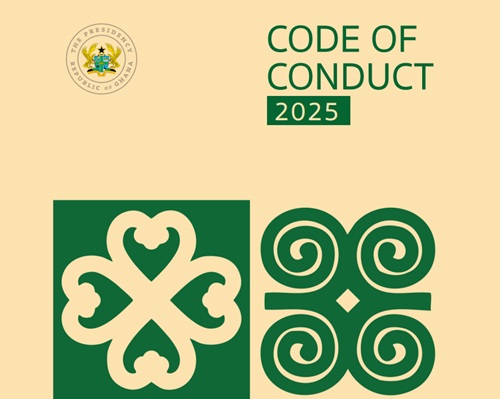President John Dramani Mahama’s newly launched Code of Conduct for political appointees introduces a sweeping framework aimed at strengthening ethical leadership and accountability in government.
The document, which binds all ministers, deputies, chief executives, and presidential staffers—including the President and Vice-President—was unveiled at Jubilee House on May 5, 2025.
Below are 10 key directives appointees must now adhere to under this legally binding Code:
1. No acceptance of gifts over GH¢20,000 without declaration
Appointees must not accept gifts or favours from individuals or businesses with interests in government decisions. Gifts exceeding GH¢20,000 must be declared and can only be retained with written presidential permission.
2. Strict ban on buying state assets
Political appointees are barred from purchasing government properties—land, buildings, vehicles, or shares—either directly or indirectly. Violators face immediate dismissal.
3. Declare assets or face dismissal
All appointees must declare their assets. Those who took office before March 31, 2025, had until May 7 to comply or risk losing three months’ salary or even dismissal.
4. No use of public funds for gifts or hampers
The Code prohibits the use of public funds, including internally generated funds, to purchase hampers or gift items, except modest ones given for staff excellence or retirement with prior approval.
5. Declare conflicts of interest
Appointees must disclose all business interests, especially those connected to government agencies. They are forbidden from using their positions to benefit relatives or associates.
6. Ban on nepotism and influence peddling
Using influence to secure contracts or appointments for friends or family is outlawed. Even the appearance of bias is grounds for investigation.
7. Mandatory reporting of official travels
All official and unofficial foreign travels require prior approval from the Chief of Staff. Appointees must file a report within 14 days of returning.
8. Sanctions for breach of code
Offenders face penalties ranging from reprimand and suspension to dismissal. The President made clear that "there will be no sacred cows."
9. Online reporting system for citizens
A digital portal is being established to allow citizens to confidentially report suspected breaches, ensuring community oversight.
10. Regular ethics briefings and training
Appointees will undergo periodic ethics training and must sign annual declarations reaffirming their commitment to the Code.
President Mahama described the Code as “strict but necessary,” noting that its implementation marks a return to discipline and integrity in public service. “This is a government of shared responsibility,” he said. “Let us walk this path together with discipline, humility and a clear sense of duty to the people of Ghana.”
Code of Conduct and Ethics for all political appointees by Kweku Zurek

